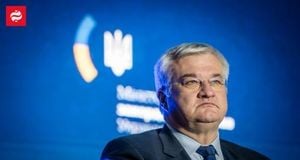In a striking display of political showmanship and economic maneuvering, President Donald Trump has leveraged tariffs and personal diplomacy to pressure technology giants such as Apple into dramatically expanding their U.S. manufacturing footprint. The latest chapter unfolded on August 6, 2025, when Apple CEO Tim Cook presented Trump with a custom gold-based glass piece—crafted by iPhone glassmaker Corning—during a high-profile Oval Office meeting. But behind the glittering gift was a far more substantial offering: Cook’s pledge to invest an additional $100 billion in American operations, bringing Apple’s total U.S. investment to a staggering $600 billion over the next four years.
The meeting was more than ceremonial. According to AFP, Cook’s gesture and announcement came amid mounting pressure from the Trump administration on tech companies to "bring manufacturing home." Trump has wielded tariffs as a blunt instrument, threatening punitive measures against companies that continue to rely on overseas production. The president’s tactics have resonated with the public, fueling online enthusiasm for a “Made in USA iPhone” and generating political capital for his administration.
Apple’s new American Manufacturing Program (AMP) is at the heart of this shift. The initiative aims to relocate more of Apple’s supply chain and advanced manufacturing to the U.S., incentivizing global partners to follow suit. The program’s headline project is a $2.5 billion expansion of Apple’s long-standing partnership with Corning, which will see all iPhone and Apple Watch cover glass produced in Corning’s Harrodsburg, Kentucky facility. For the first time, every unit sold worldwide will feature glass made entirely in the United States. Corning, in turn, will dedicate the facility exclusively to Apple, increasing its manufacturing and engineering workforce in Kentucky by 50 percent.
Apple’s announcement sent ripples through the market. As reported by multiple outlets, the company’s stock soared 11.6 percent in the week following the announcement, with an immediate 5 percent jump after the Oval Office event. Investors and analysts alike interpreted the move as a sign of Apple’s ability to navigate political headwinds while securing long-term growth.
Yet the backdrop to this strategic pivot is anything but harmonious. As detailed by CNBC and The New York Times, Cook’s relationship with Trump has been fraught. In May, Cook declined to join Trump’s Middle East trip—a decision that reportedly irked the president. Trump didn’t hesitate to air his grievances in public, praising other tech leaders who accompanied him and pointedly criticizing Cook. The tension escalated when Trump, during a stop in Riyadh, lauded Nvidia’s Jensen Huang for attending, quipping, “I mean, Tim Cook isn’t here but you are.” Later, in Qatar, Trump remarked, “I had a little problem with Tim Cook,” before threatening a 25 percent tariff on iPhones made outside the U.S.
The pressure campaign reached a crescendo on August 6, when Trump announced plans for a sweeping 100 percent tariff on chips and semiconductors for companies not manufacturing domestically. In his words, "But the good news for companies like Apple is if you’re building in the United States or have committed to build, without question, committed to build in the United States, there will be no charge." The specifics of the exemption remain murky, but the message was clear: cooperate or face financial pain.
Observers have debated whether Cook’s Oval Office appearance—complete with the golden gift—was an act of genuine support or a pragmatic calculation. As one columnist put it, “It’s not even a case of ‘kiss the ring and receive preferential treatment.’ It’s more a case of ‘kiss his ass or else you’ll face punishment.’” Critics argue that Apple, despite its immense size, is ultimately subject to the whims of federal power. The company’s decision to accelerate its investment plans, they contend, is less about fealty and more about survival in a political environment where, as the same columnist noted, “ruthless practicality is necessary merely to stay afloat in a sea of abject graft, extortion, and cronyism.”
While Apple’s U.S. manufacturing ambitions align with Trump’s economic nationalism, the president’s transactional approach extends far beyond Silicon Valley. According to AFP, foreign leaders have sought to curry favor with Trump through grand gestures of their own. Cambodia’s Prime Minister Hun Manet, for instance, nominated Trump for the Nobel Peace Prize, citing his “visionary diplomacy.” Israel and Pakistan followed suit with their own nominations. British Prime Minister Keir Starmer arrived in Washington bearing a letter signed by King Charles III, inviting Trump for an official visit, and went so far as to praise two of Trump’s golf clubs during a separate meeting in Scotland.
Not all attempts at flattery have succeeded. Swiss President Karin Keller-Sutter made an emergency trip to Washington in hopes of averting a 39 percent tariff on nearly 60 percent of Swiss exports, only to be rebuffed. As Trump told CNBC, “The woman was nice, but she didn’t want to listen.” The episode underscored the unpredictable nature of Trump’s decision-making—and the high stakes for those seeking favorable treatment.
Lavish gifts have become a recurring motif in Trump’s second term. In March, FIFA President Gianni Infantino presented the Club World Cup trophy—a massive golden sculpture that lingered in the Oval Office for weeks. But the most eye-catching offering came from Qatar: a Boeing 747 valued at $400 million, earmarked to become the new Air Force One. Despite criticism from Democratic opponents, Trump brushed aside concerns, stating, “It would be stupid not to take it.”
The convergence of political power and corporate ambition has drawn both admiration and unease. For Apple, the current investment surge is not an abrupt departure from its past trajectory; the company had previously announced a $430 billion U.S. manufacturing plan under the Biden administration. What’s changed is the spectacle—the made-for-TV announcements, the Oval Office ceremonies, and the unmistakable sense that participation is no longer optional.
For all the fanfare, the path forward remains uncertain. Tariff threats hang over the industry, and the criteria for exemption are, as some observers note, “up to the whims of Trump.” Apple’s leadership, meanwhile, continues to walk a tightrope—publicly embracing American manufacturing while quietly navigating the hazards of presidential politics. As Cook himself remarked during a recent analyst call, “The way that we look at AI is that it’s one of the most profound technologies of our lifetime, and I think it will affect all devices in a significant way.” Yet on questions of strategy and risk, he offered little detail, saying only, “I wouldn’t want to really talk about today because that gives away some things on our strategy.”
In the end, Apple’s $100 billion bet on U.S. manufacturing is as much a testament to the company’s adaptability as it is to the evolving nature of American capitalism. Whether driven by conviction, coercion, or a blend of both, the move signals a new era in which the world’s most valuable tech companies must navigate not only market forces but also the shifting tides of power in Washington. For now, at least, Apple appears willing to play the game—however crooked the rules may seem.




